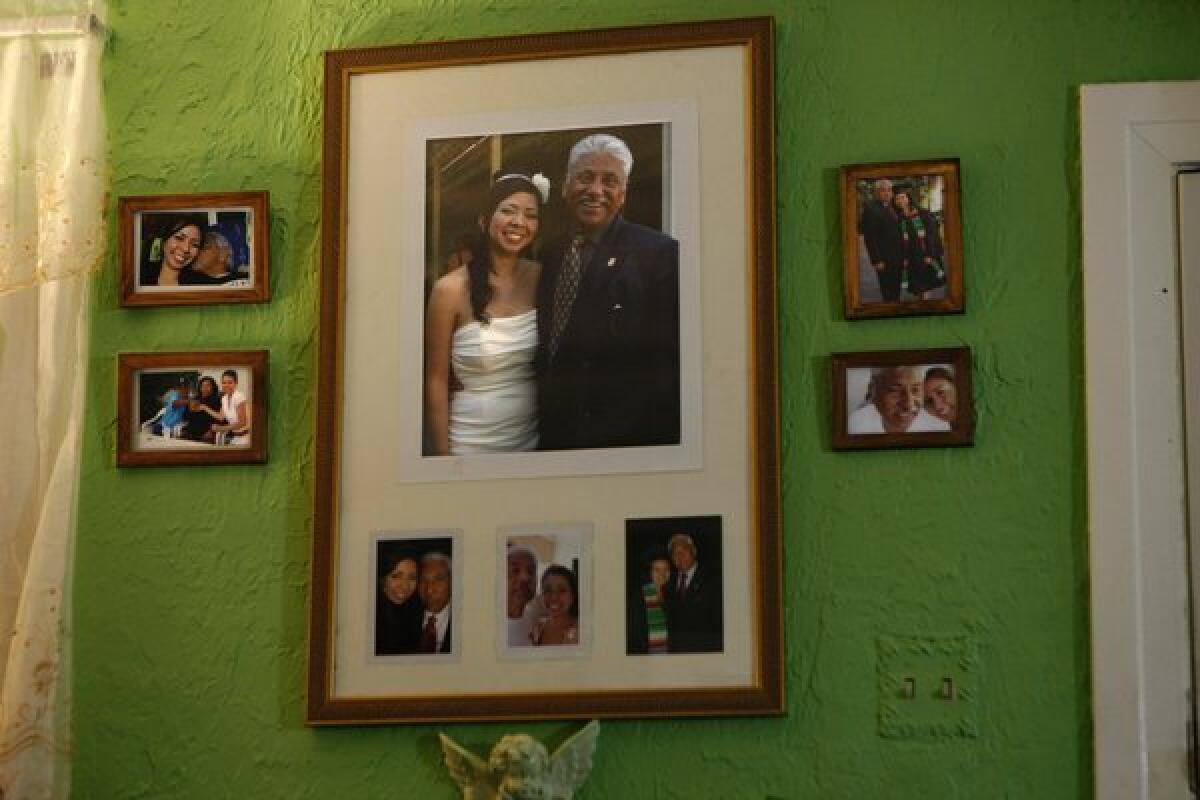Trying to prove their love
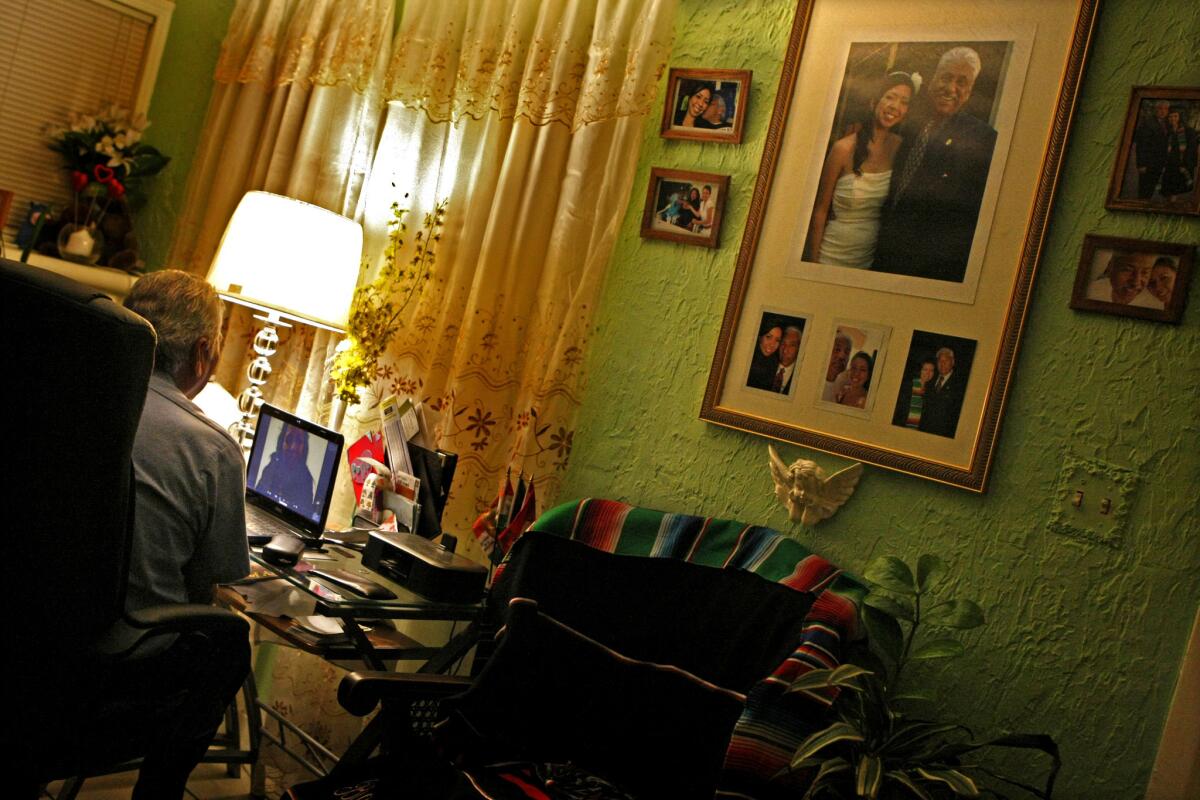
A couple’s devotion bridged a 41-year age gap, but a U.S. official said their marriage couldn’t be real.
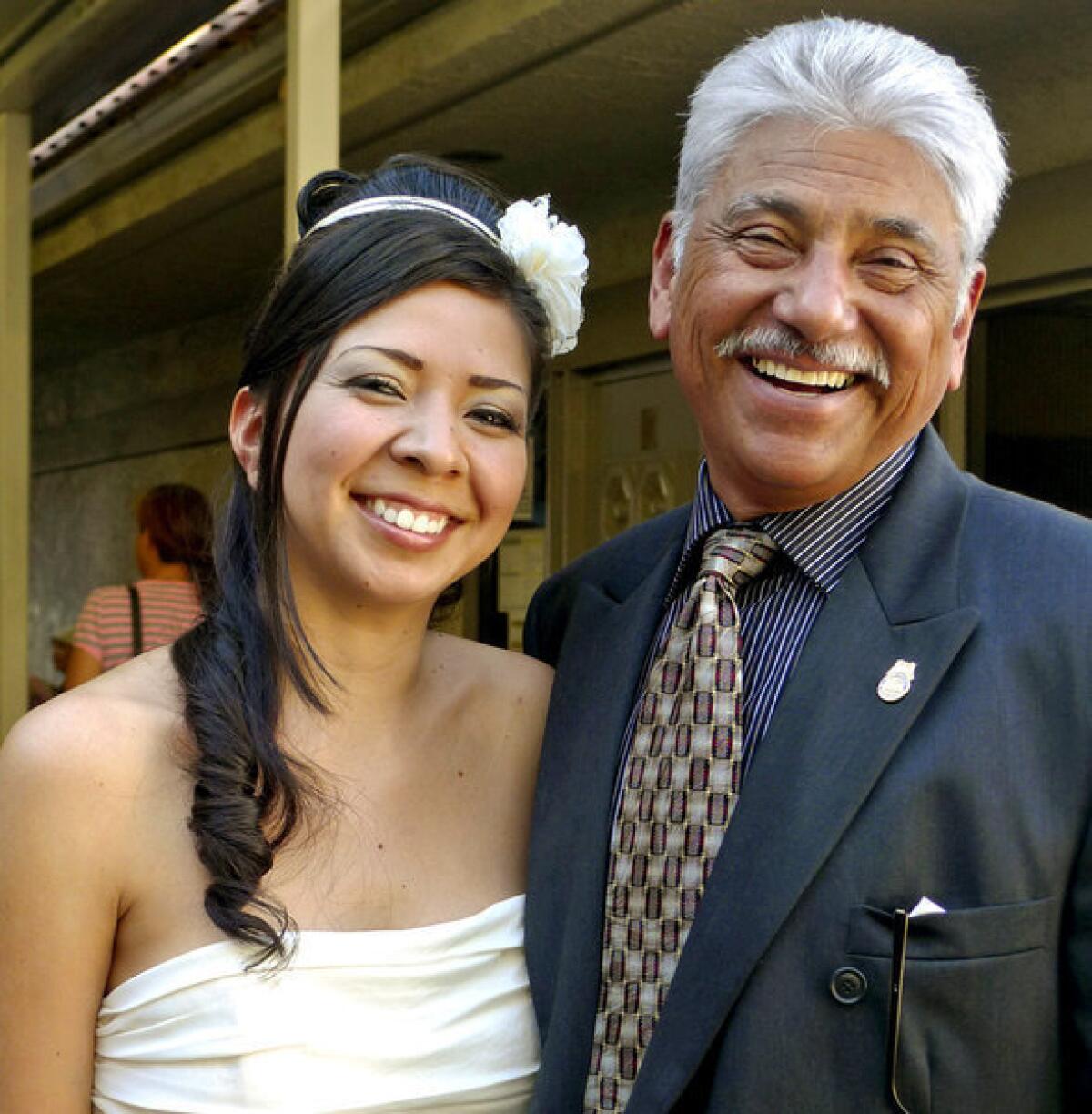
She was a brainy honors student bound for UC Berkeley. He was a chatty Glendale city bus driver who never missed Sunday Mass. He called her Chiquita — little one. She called him Pollo — chicken, for his skinny legs.
Her mother called him something else: El Viejito — the little old man.
When their romance bloomed in 2008, Ana Verdin-Hernandez was 22 and Gerardo Herrejon was 63. Ana's friends and family were scandalized. How could she throw away her youth on a man with an eighth-grade education and three children older than her?
Two years later, Ana and Gerardo got married anyway and moved into Gerardo's bungalow-style home in Cypress Park. Over time, their apparent devotion swayed many doubters. After all, Gerardo was spry and with his full head of hair looked much younger than his age. And Ana had always gravitated to older people, an old soul trapped in a young woman's body.
But there was one more person to convince: the official eyeing the couple suspiciously across the desk at the U.S. Consulate in Ciudad Juarez, Mexico, on a foggy day in March 2012.
Gerardo was a U.S. citizen; Ana, who had been brought into the country as a child, was an undocumented immigrant. U.S. laws require illegal immigrants from Mexico who marry Americans to apply for a visa at the consulate in Juarez.
It was risky. If the woman at the consulate didn't believe Ana and Gerardo's marriage was real, Ana would be barred from returning to the U.S. for as long as 10 years.
It would mean that Ana had, in effect, deported herself.

Boys her age never much interested Ana.
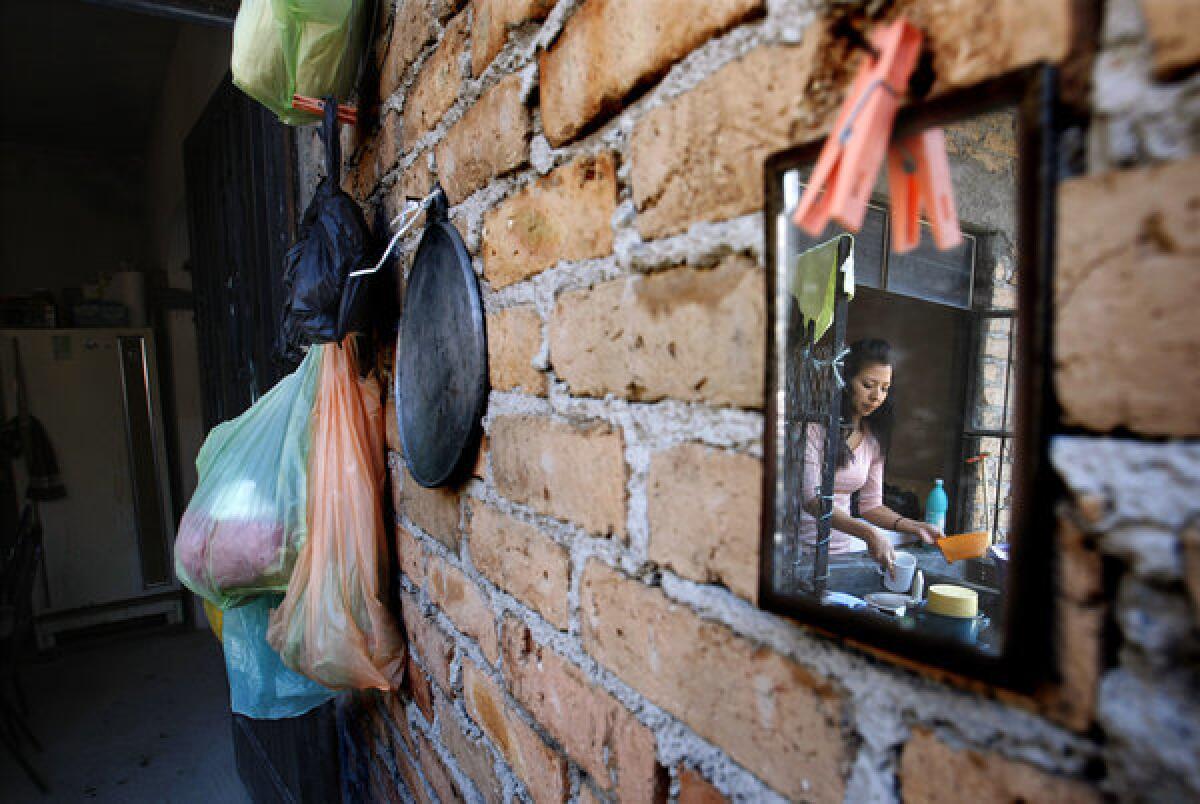
Ana at her aunt's home in Tepic, Mexico. More photos
She spent most nights hunched over the kitchen table, buried in textbooks while her nieces and nephews swarmed over the one-bedroom apartment she shared with six other people. She had lived in Southern California since she hiked over the mountains into the U.S. when she was 7. Her mother, Rafaela, held her hand along the way. Ana never knew her father, who had abandoned the family when she was a baby.
Gerardo drove his bus past Ana's apartment on Western Avenue almost every day. He was a lonely divorced man who treated his passengers like family, greeting regulars by name and bringing doughnuts on birthdays.
Ana took his bus to Glendale Community College, where she had enrolled after graduating from high school in 2004. Every day Gerardo would say hello. Every day she would pass by, not saying a word.
Ana was often late to her stop, but Gerardo would wait for her. On his morning loops that took him past her apartment, he would honk. Ana would get up and hurry to catch the bus on his next loop through town. The honk became her wake-up call.
The years passed. Ana was still a student at the Glendale college. Gerardo was still a Glendale bus driver. He always waited, always honked.
Then, in 2008, Ana was accepted to UC Berkeley. A few weeks before leaving for the Bay Area, she asked Gerardo if he wanted to join her for a frozen yogurt. Their first moments together outside the bus were awkward. He was respectful but nervous and avoided eye contact. She liked that.
She had surprised herself by asking Gerardo out. Dating him had never crossed her mind, but over the years his relentlessly cheerful demeanor and kind ways with passengers had grown on her.
"He was the same year after year," she said. "I never once saw him mad."
For the next two years, Ana spent her breaks from school with Gerardo in Los Angeles.
Then he would drive up the I-5 and drop Ana off at her college, like he always had.


Gerardo Herrejon on his bus route. More photos
Ana's mother wasn't the only maternal figure she had to answer to. Ana had befriended two arts instructors whom she met as a child riding horses at a girls' empowerment program at Griffith Park. Impressed by her fortitude, the women had encouraged Ana to apply to Berkeley and helped raise $50,000 for her tuition and living expenses.
Ana's new beau intrigued them: Did he share Ana's love of Spanish literature? Was he a dashing immigrant rights activist?
Judith Hopkins, the former executive director of the equestrian empowerment program, Taking the Reins, was dismayed when she first saw Ana and Gerardo together at the equestrian center where Ana taught youngsters how to ride horses.
"I remember, honestly, I was a little [annoyed] about the whole thing," said Hopkins, a former photography instructor at Los Angeles-area community colleges. "I told her, 'You're dating someone old enough to be your father and he's a bus driver....You're closing off your world up there.'"
"When I met him I thought…he's handsome, in an older guy kind of way," said Sally Stein, a former art history professor at UC Irvine who held fundraisers for Ana at her Koreatown home. "He would be a very appropriate choice for me. I'm 63."
Ana felt she had disappointed her friends. "They made me feel special because they believed in me, that it would be a good investment and it wasn't going to go to waste."

Six months after Ana graduated with a major in Spanish in May 2010, she and Gerardo got married at the storefront office of the Los Angeles County registrar/recorder's office in East Los Angeles.
The newlywed Gerardo regaled his passengers with stories of his wife and brought his wedding photo album on the bus. Kim Smith, a human resources manager, was one of the regulars who leafed through the pages on her way to work.
"When I first looked at her and noticed the age difference, immediately I thought, ‘Yeah, right. This is probably not real,'" Smith said. "But he was truly gushing over this person, really in love with her and proud to be married with her." Soon Smith was sharing the album with other riders, saying: "Can you believe that's his wife? He's got it goin' on."
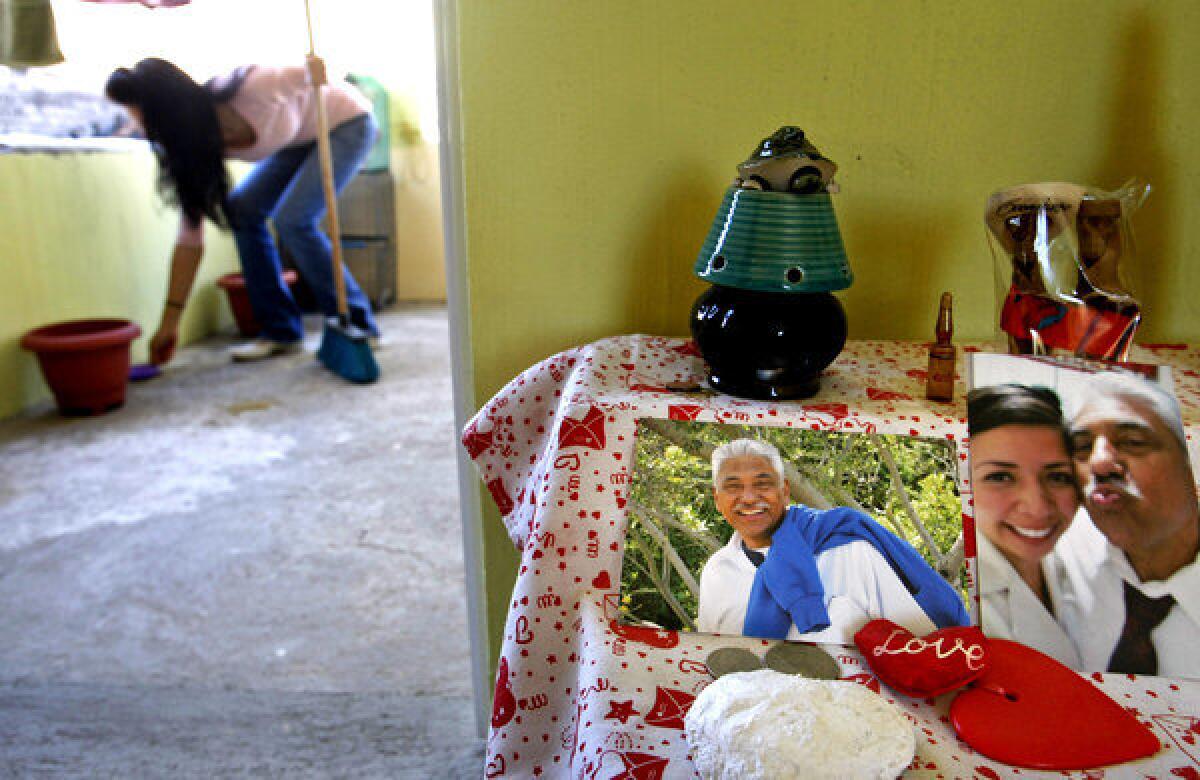
Ana in Tepic, Mexico. More photos
Ana, meanwhile, was struggling. Without a Social Security card, she was locked out of the workforce. Without a driver's license, she couldn't drive. She stayed busy giving Spanish lessons to people who saw the fliers she posted on Mount Washington street corners. She also volunteered to teach immigrants English.
In early 2012, a letter arrived from U.S. Citizenship and Immigration services, telling Ana to report to the consulate in Juarez to process her spousal visa. Her mother and others begged her not go, saying it was too dicey to leave the country as an undocumented immigrant.
But Ana, with support from Gerardo, decided there was no other way to normalize her immigration status. Sally Stein paid her airfare.

Ana brought a stack of documents, including her UC Berkeley diploma, reference letters and the Los Angeles County marriage certificate dated Nov. 5, 2010, that said Ana and Gerardo were husband and wife.
The consular officer didn't look at the documents.
"I think this marriage is a fraud," she told Ana. "I think you married him to get your papers."
Ana started to cry.
The consular officer didn't offer any tissue.
She told Ana that Gerardo would also need to be interviewed.
Since we've got nothing to hide, we thought everything would be OK."— Gerardo Herrejon
Two weeks later, Gerardo was in Mexico, wearing a blue suit with a red tie and a confident smile as he walked into the interview room.
The consular officer's questions seemed simple enough to Ana. What is Gerardo's mother's name? Sara. How many rooms are in his house? Five. How many children does Gerardo have? Three. Were you intimate last night? Yes.
Gerardo, interviewed separately, also got some easy questions. Who does the cooking? I do. What's Ana's birthday: Nov. 16, 1985. Where did you get married: Los Angeles. Were you intimate last night? No.
Ana was hopeful that he would sway the officer's opinion, until he emerged from the interview and they started comparing notes in the waiting room.
They realized they had flubbed the intimacy question. Ana considered cuddling intimacy. Gerardo thought it meant making love. That wasn't the only question he failed, Gerardo said.
He had been asked for the name of Ana's mother, for Ana's cell-phone number, the date of their anniversary. He couldn't remember any of them. Ana wasn't that surprised. Gerardo, his nervous, racing mind cluttered with dates of children and grandchildren, had shown his age.
At one point, the officer accused Gerardo of being Ana's father. She asked if he would be willing to take a DNA test. Infuriated, Gerardo almost stormed out of the room.
Gerardo had not prepared for the interview, believing that the documents and photo album would be sufficient. "Since we've got nothing to hide, we thought everything would be OK," he said.
After a two-hour wait Ana and Gerardo were summoned to the counter. The officer informed them that the visa application was being denied.
Ana walked out of the consulate in tears.
The next day, Ana kissed Gerardo goodbye at the bridge spanning the Rio Grande. He walked back to El Paso. She took a bus to her mother's hometown in western Mexico.
Not long afterward, the Obama administration announced new rules that would change the lives of many young illegal immigrants. They would be granted the opportunity to apply for work permits and reprieves from deportation.
The policy applied to people who had been brought into the country as children, like Ana.

The staircase leading to Ana's bedroom at her aunt's home in the town of Tepic lacks a handrail, and the landing at the top of the stairs has no external wall. One errant step and a person can plunge to the concrete one floor below. The house, basically a brick shell with steel rods poking out — has been under construction for eight years.
Gerardo visited in September and painted the walls of her room lime green and beige, the same colors as his living room in Los Angeles.
Ana's room is an oasis of neatness amid the construction clutter. She has decorated it with cardboard tables displaying pictures of her and Gerardo. He visited in September and painted the walls of her room lime green and beige, the same colors as his living room in Los Angeles.
For a while Ana worked as a shop girl downtown, selling work boots and re-stocking display cases with lipstick and hair dye. When she tried to get a better job at a stationery story, the manager said she was overqualified. The job paid $120 per month.
In a town chock full of English-language schools, she thinks her UC Berkeley degree works against her, that the teachers see her as a threat to their jobs. Many speak heavily accented English and don't have college degrees.
One recent day, Ana applied for a job at the English is Easy Corporation. "Conecting you with the world," the school sign said.
"They misspelled it. You can't trust these people," Ana said. "No wonder they don't hire me."

Gerardo calls three times a day.
"I miss you here," he said during one recent Skype session.
"Yes, of course you do, you need me to make your coffee," she joked.
For 30 minutes they talked, a conversation filled with everyday familiarity and the longing of prolonged separation. He told her to deposit money in the bank. She told him to take his vitamins.
He made her a promise.
"Tomorrow, I'm going to love you more than today," Gerardo said.
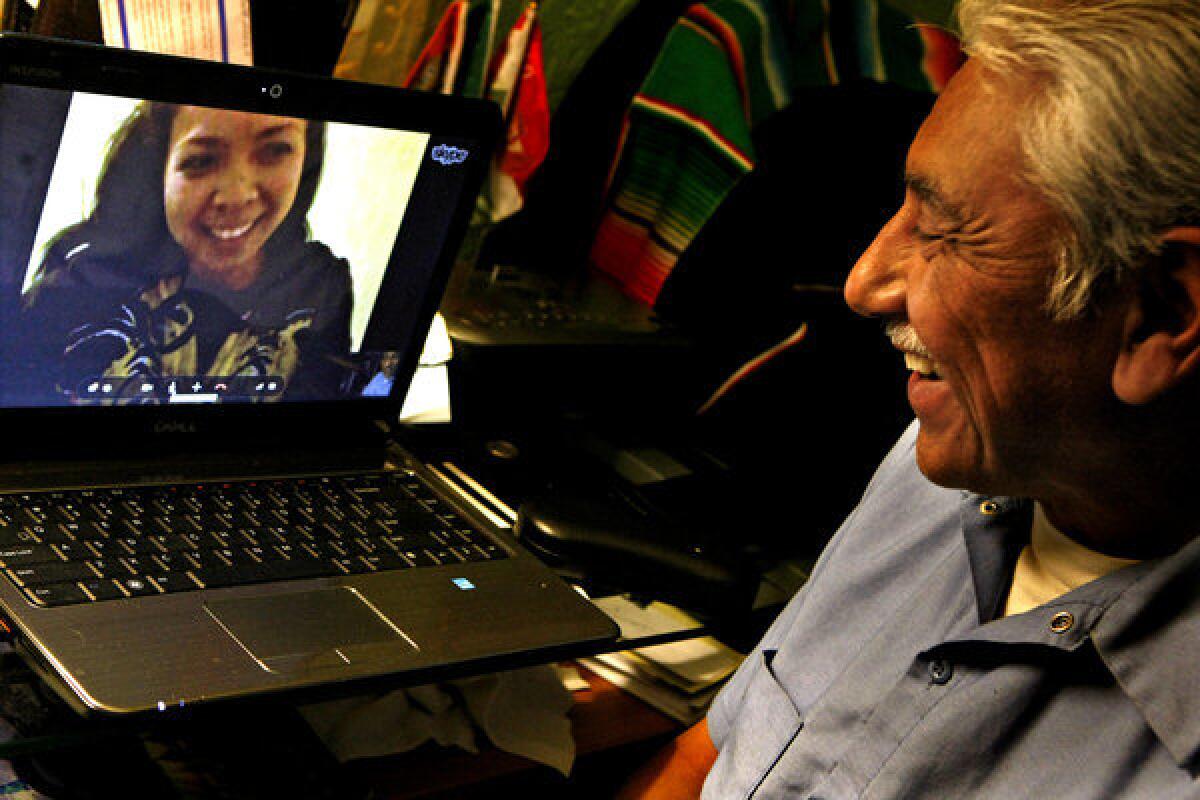
Ana and Gerardo talk over the Internet. More photos
"You always tell me that," Ana said, blushing.
She told him that she had received a new book and a purse, gifts from her friend Sally Stein, who still felt guilty for paying for Ana's trip to Mexico.
Gerardo mentioned that he would soon visit their attorney to get an update on their case. They are appealing the decision to deny Ana's visa application.
She didn't want to talk about it. Ana has hope they will get a chance for another interview, but knows the process can take up to two years.
"OK," Gerardo said, yawning. "I'm going to go to sleep now."
"Five minutes more," she said.
It's their running joke. Ana, a night owl, always wants to stay up late. He's an early bird. They're opposites in other ways. He guffaws at his own jokes. She giggles. He gulps his beer, she sips her tea. And there's the age difference, of course.
Ana admits it, they are an odd couple. But not a fake couple.
Besides, if she wanted to fake a marriage, she botched it. "Don't you think I would have chosen someone much younger so people would believe me?" she said.
Gerardo still drives the bus every day and greets riders with a smile and waves at pedestrians in crosswalks. Ana recently sent him a blue rosary that he hangs every day on the dashboard. Once, after swerving away from a speeding car and narrowly avoiding an accident, Gerardo gave the beads a tender touch.
"I said, 'Gracias, Ana.'"
Without a country: A Times series on immigration and families
Column One: More great reads from the Los Angeles Times
Girl wrestlers grapple with stereotypes
Sign up for Essential California
The most important California stories and recommendations in your inbox every morning.
You may occasionally receive promotional content from the Los Angeles Times.
